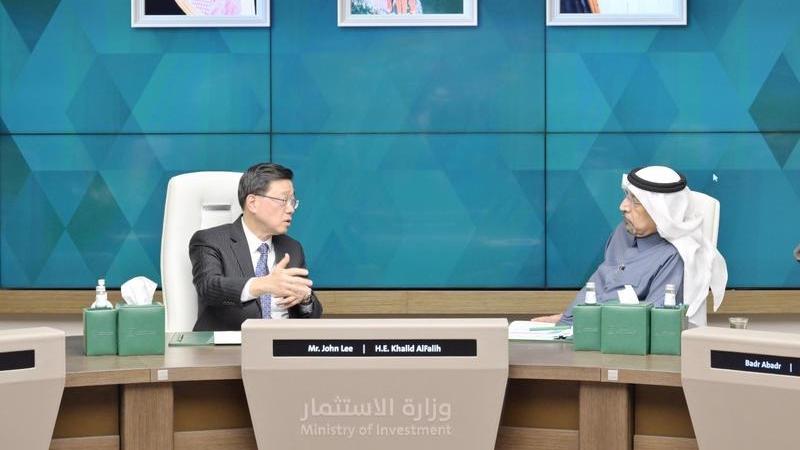 Chief Executive John Lee Ka-chiu (left) meets with Minister of Investment of Saudi Arabia Khalid Al-Falih in Riyadh, Saudi Arabia on Feb 5, 2023, during his visit to Saudi Arabia as part of his Middle East tour. (PHOTO / HKSAR GOVERNMENT)
Chief Executive John Lee Ka-chiu (left) meets with Minister of Investment of Saudi Arabia Khalid Al-Falih in Riyadh, Saudi Arabia on Feb 5, 2023, during his visit to Saudi Arabia as part of his Middle East tour. (PHOTO / HKSAR GOVERNMENT)
The ever-expanding cooperation between Hong Kong and the Middle East heralds a bright and promising future for both regions, Middle Eastern business leaders said, adding that this partnership, marked with dynamism and mutual benefit, is emblematic of the ever-evolving global landscape, where collaboration knows no bounds.
“Both Hong Kong and the Middle East are strategically positioned as key players in the global trade and investment landscape. The Belt and Road Initiative will continue to enhance connectivity between the regions, creating new trade routes and investment opportunities,” said Ali Al Ebrahim, founder and CEO of COFE, a Kuwait-based online coffee marketplace.
Saudi Arabia has the world’s seventh-largest stock market with a total capitalization of $3 trillion. The country aims to increase the market value of the stock market as a percentage of GDP to 88 percent by 2030 from 66.5 percent in 2019
The Middle East region is seen as a key link in the Belt and Road Initiative given its strategic geographical location at the crossroads of Europe, Asia, and Africa. Moreover, Middle Eastern countries, such as the United Arab Emirates, Qatar, Saudi Arabia, and Kuwait have invested heavily in building world-class infrastructure.
READ MORE: Opportunities for HK-Middle East collaboration are endless
The Hong Kong government has ramped up efforts to boost ties with the Middle East, with the aim of strengthening economic, trade and cultural cooperation.
Ebrahim said the cooperation between Hong Kong and Middle Eastern business is likely to expand beyond traditional sectors and encompass emerging industries such as technology, renewable energy, and healthcare.
Nevertheless, he added that expanding partnership calls for a proactive strategy to overcome cultural and commercial barriers.
“There are significant disparities between Hong Kong and the Middle East in terms of business procedures. In contrast to the Middle East, which frequently places a larger value on interpersonal ties, in business dealings, Hong Kong is recognized for its quick-paced, effective, and transparent corporate climate. These disparities demand a sophisticated method of collaboration, Ebrahim said.
Jerry Li Jinji, founder and managing partner of Saudi-focused venture capital firm eWTP Arabia Capital (eWTPA), said the prospects for closer collaboration between Hong Kong and the Middle East present a rosy picture in areas including financial and new energy sectors.
Saudi Arabia has the world’s seventh-largest stock market with a total capitalization of $3 trillion. The country aims to increase the market value of the stock market as a percentage of GDP to 88 percent by 2030 from 66.5 percent in 2019.
“As one of the global financial centers, Hong Kong can greatly support the development of Saudi Arabia's stock and bond markets. Hong Kong's fintech companies can also enter the Saudi market by partnering with local firms,” Li said.
Saudi Arabia aims to increase the market value of the stock market as a percentage of GDP to 88 percent by 2030 from 66.5 percent in 2019
“And Hong Kong can also invest in Saudi Arabian fintech companies that have strategic value,” he added.
In terms of the new energy sector, Li said the Middle East has abundant energy resources and proactive regulatory policies, but their digital infrastructure development still has room for improvement, especially in the areas of transportation and communications, for which there is great demand.
Hong Kong’s financial strength can thus provide support and cooperation opportunities for the Middle East’s infrastructure development, he said.
According to Li, eWTPA has hosted more than 100 Hong Kong partners in Riyadh over the past six months covering real estate, finance, trade, innovation and technology, and biotechnology sectors.
“We are actively promoting the business of these institutions and enterprises to land in Saudi Arabia, and we will organize a number of Hong Kong delegations from different industries to visit Saudi Arabia from October to December this year to help them further integrate into the Middle East ecosystem,” Li said.
Alfred Wang, CEO of Saudi Arabia-based Navigator Consulting, said there is enormous room for cooperation and exchanges between Hong Kong and the Middle East in areas like e-commerce, blockchain technology, artificial intelligence and the internet of things.
“Meanwhile, the Middle East also has long-term goals and plans regarding sustainable development, which is precisely the area in which Hong Kong has always had leading experience, especially in green finance,” he said.
READ MORE: Change mindset to unlock business potential in MidEast
Hailing Hong Kong’s financial strength, Wang said the specialization of Hong Kong's financial services impressed the consulting firm’s Middle East clients through a series of roadshows during the Belt and Road Summit, kicking off to a good start for further cooperation.
“It is believed that, in the future, more Middle Eastern enterprises will be able to make good use of Hong Kong’s financial infrastructure to realize cross-border exchanges, financing or investment cooperation,” Wang said.
He added that Hong Kong’s growing entrepreneurial ecosystem, diverse cultural landscape and abundance of international talent can all help the city to better understand and serve Middle Eastern enterprises and promote cultural exchange as well as business cooperation.
Contact the writer at evanliu@chinadailyhk.com


